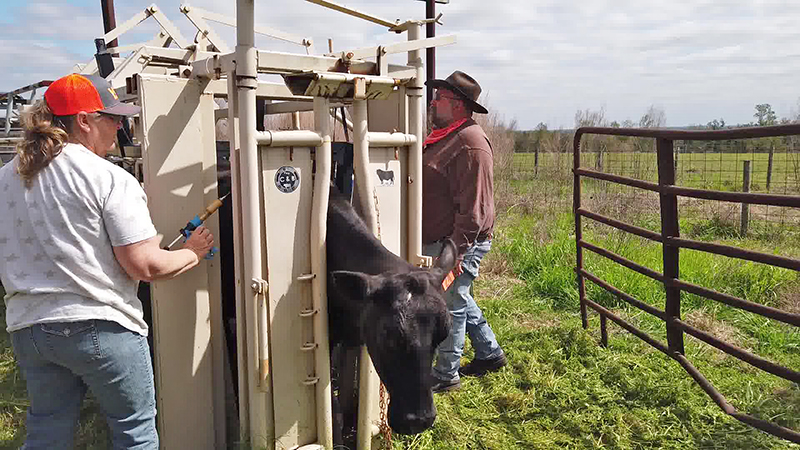
Antibiotics will require a prescription from a veterinarian before purchase after June 11, 2023. Vaccines and wormers will not require a prescription and will still be available for purchase over the counter from traditional Sources. Photo: Flying Y Ranch spring cattle working, Marianna, Florida. Credit: Doug Mayo, UF/IFAS
Just in case you have not heard already, the Food and Drug Administration (FDA) has implemented changes to how antimicrobials (antibiotics) will be sold for livestock production starting June 11th, 2023 through the Guidance for Industry (GFI) #263. None of the standard antibiotic products have been banned for use, they just will not be sold over the counter (OTC) and will require a prescription from a licensed veterinarian. The intent of the FDA rule is to reduce antibiotic resistance in animal and human medicine. Examples of antibiotics that will no longer be sold OTC include: Oxytetracyclines (LA 200, Scour tablets), Penicillin (injectable and mastitis tubes), Sulfa-based antibiotics (injectable and boluses), Tylosin (injectable), and Cephapirin (mastitis tubes).
Cattle ranchers typically rely on a limited set of hired resource people. Ranchers wear many hats including mechanic, fence builder, tractor driver, accountant, business manager, and medical first responder for issues that arise. Going forward, however, a Veterinarian Client Patient Relationship (VCPR) will be required to obtain prescriptions for antimicrobial drug use. Veterinarians are liable for what they prescribe, so they will want to know the owner/manager and the health protocols for the operation before they write a prescription. These prescriptions will include a set timeline and specific instructions for drug use as well.
–
How will this new rule affect cattle producers going forward?
- I recommend that you build a relationship with a veterinarian before you have a crisis to manage that requires antibiotic prescriptions for sick animal treatment. One of our local veterinarians in the Panhandle, Todd Anderson, DVM, DACT, shared with me examples of the types of relationships he has with the cattle ranchers he works with. “I like to have a scheduled visit at least once per year. These can be to examine the herd during spring vaccinations, to perform pregnancy testing in the fall, or for breeding soundness exams of bulls. The best option, however, is to schedule an annual session to review the herd health and management of the herd. Once we have a relationship, we stay in touch through the year as issues arise.” If you are not sure of which veterinarians have large animal practices in your area, contact your county extension agent or your local cattlemen’s association. Interview the veterinarians in your area to find one you feel comfortable working with on a regular basis.
– - A prescription might be written for a single animal or for a group of cattle during a specific time period. If you have a health protocol developed with the help of your veterinarian, this process could be fairly straightforward without much disruption. The bottom line though is, your veterinarian will be part of the decision process for antibiotic use from this point forward.
– - The next issue will be where to purchase prescribed antimicrobial drugs from. Even if you have a prescription signed by your veterinarian, you may not be able to purchase antibiotics from local farm supply dealers anymore. You can either order directly from the veterinarian that wrote the prescription or from a licensed animal pharmacy. If you order drugs from a pharmacy, then the supplier will need a copy of each prescription for their records when products are ordered. You also need to save a copy of these prescriptions records as well for at least two years.
–
What about vaccines and wormers?
FDA has restricted the use of antimicrobial drugs for livestock, but not all animal health products. Vaccines, dewormers, injectable and oral nutritional supplements, ionophores, probiotics, and topical nonantibiotic treatments will not require a veterinary prescription. These products will continue to be sold over the counter (OTC) through traditional farm supply and feed stores as before. However, since you will begin working directly with a veterinarian, you may want to also seek their advice on which animal health products would be best for your herd. The idea here is to make the most of the client/patient relationship to improve the overall health and productivity of your herd.
No matter how you feel about FDA’s new rule for antibiotic restrictions, the point is that you don’t want to lose the effectiveness of antibiotics for treatment of sick animals in your herd. These products have not been banned from future use, but now require a veterinarian prescription to purchase and use them. Having a herd health consultant will also help you make more informed decisions about the best products and dosages to use for specific health issues. If you currently don’t have a relationship with a specific large animal veterinarian, now is the time to start one. Act now. Don’t wait for a crisis to start working with a local veterinarian.
–
More information on this topic is available in the following publication:
GFI #263: Frequently Asked Questions for Farmers and Ranchers
- November 2025 Weather Summary & Winter Outlook - December 5, 2025
- Friday Feature: The History of Beekeeping - December 5, 2025
- Friday Feature:Malone Pecan Festival Tractorcade - November 21, 2025
